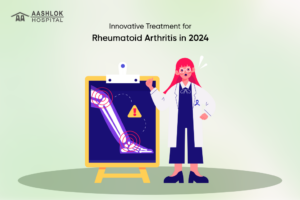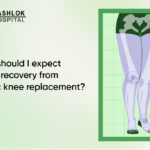Innovative Treatment for Rheumatoid Arthritis in 2024

Rheumatoid arthritis (RA) is a chronic condition affecting millions worldwide. The disease leads to joint pain, swelling, and difficulty in movement. Advancements in treatment methods now offer patients new options. The new treatments for rheumatoid arthritis 2024 aims to reduce symptoms and improve life quality. If you are living with RA, options available today may help you manage pain and regain your lifestyle. With a committed team and patient-centered care, Aashlok Hospital can support your journey to better joint health.
Also Read : Know about the causes, symptoms, and treatment of arthritis
Rheumatoid Arthritis and Its Effect on You
Rheumatoid arthritis is an autoimmune disease that causes the body to attack its own joints. It affects people of all ages and can lead to symptoms that interfere with daily life. Knowing how RA impacts your joints and body helps you understand the need for timely treatment. Early detection and care are key to reducing pain and preventing further joint damage.
-
Pain and Joint Inflammation
RA typically starts in smaller joints like fingers and toes, then moves to larger joints. Inflammation leads to swelling, warmth, and stiffness, especially in the morning or after rest. Over time, this can damage joint tissues, impacting mobility.
-
Fatigue and Loss of Energy
Along with pain, fatigue is a common symptom of RA. This fatigue may affect daily activities and reduce productivity. RA can also cause muscle weakness around affected joints, further limiting movement and causing discomfort.
-
Emotional Impact
Chronic pain and reduced mobility can affect mental health. People with RA often feel stress and anxiety due to their physical limitations. Recognizing these effects is vital for managing overall health and quality of life.
-
Loss of Appetite
RA inflammation can sometimes cause a loss of appetite. This may lead to unintended weight loss and, over time, nutritional deficiencies, making it harder to manage the condition effectively.
-
Eye Problems
RA may cause dry eyes or inflammation in eye tissues, leading to discomfort and vision problems. In rare cases, it can lead to more serious eye conditions like scleritis, which requires prompt medical attention.
-
Lung Complications
RA can cause inflammation in the lungs, leading to conditions like interstitial lung disease. This can result in shortness of breath, a persistent cough, and, in severe cases, may require specialized treatment to manage.
-
Skin Nodules
RA can lead to small, firm lumps under the skin, known as rheumatoid nodules. These nodules often form near affected joints and can be tender or uncomfortable, though they are generally harmless.
-
Anemia
Chronic inflammation in RA can interfere with the production of red blood cells, leading to anemia. Symptoms of anemia include fatigue, weakness, and shortness of breath, which can further compound the exhaustion caused by RA.
-
Heart Disease Risk
People with RA have an increased risk of cardiovascular disease. Chronic inflammation can affect blood vessels, raising the chances of developing heart issues, including heart attacks and strokes.
Also Read : 7 Types of Arthritis: Symptoms & Pain Management Tips
New Treatments for Rheumatoid Arthritis 2024 That Can Heal Your Pain Effectively
Today, the treatment for rheumatoid arthritis has become more personalized, focusing on reducing symptoms and improving patient outcomes. In 2024, innovative approaches will provide new possibilities for RA management.
-
Biologic Medications
Biologics are an impactful rheumatoid arthritis medication that targets specific immune cells, reducing inflammation. These medications can significantly lower pain and improve joint function. Biologics are administered through injections or infusions and are often effective when traditional therapies don’t work.
-
JAK Inhibitors
JAK inhibitors are another option, especially for patients who do not respond well to other drugs. They work by blocking certain enzymes responsible for immune responses in RA. JAK inhibitors are oral medications that offer flexibility to patients.
-
Gene Therapy
Gene therapy is emerging as a potential treatment for RA. It involves altering specific genes to reduce inflammation. While still in experimental stages, gene therapy may offer long-term solutions by addressing RA at the genetic level.
-
Stem Cell Therapy
Stem cells help repair damaged joint tissues. In RA, they can regenerate cartilage and other joint structures, improving joint function. This therapy is usually administered through injections and may reduce the need for surgery.
-
Diet and Lifestyle Changes
Diet plays a role in managing inflammation. Anti-inflammatory foods like fish, nuts, and leafy greens can help. Regular exercise, gentle stretching, and maintaining a healthy weight can also improve joint function.
-
Physical Therapy
Physical therapy helps maintain joint mobility and strength. A therapist will work with patients on exercises to improve flexibility, muscle strength, and balance. These activities are designed to avoid strain and enhance comfort. Consult the best team of rheumatologists and orthopedic surgeons at Aashlok Hospital to avail yourself of the most immersive physical therapy for RA.
-
Advanced Imaging and Diagnostics
In 2024, advanced imaging techniques allow doctors to detect RA early. Techniques such as MRI and ultrasound provide detailed images of joint inflammation. Early detection is key for timely intervention, reducing pain, and limiting joint damage.
-
Platelet-Rich Plasma (PRP) Therapy
PRP therapy uses the patient’s own blood to accelerate healing. In RA, PRP can reduce inflammation and stimulate joint repair. PRP injections are minimally invasive and show promise for reducing symptoms in RA patients.
-
Nanoparticle Drug Delivery
Nanotechnology is being applied to RA treatment in 2024, enabling drugs to target inflamed joint tissues directly. This is an effective rheumatoid arthritis medication, minimizing side effects and reducing the overall dosages needed.
-
Personalized Immunotherapy
Immunotherapy customizes treatment to each patient’s immune profile, targeting cells that trigger RA inflammation. This individualized approach enhances treatment efficacy while minimizing potential side effects. Get the most trusted guidance on personalized immunotherapy at Aashlok Hospital, the best medical facility for the treatment for rheumatoid arthritis in finger joints and toes.
-
Microbiome Therapy
Microbiome therapy focuses on balancing gut bacteria, which may reduce inflammation in RA patients. Emerging studies suggest that a healthy gut microbiome positively impacts immune function, potentially alleviating RA symptoms.
-
Cytokine Inhibitors
Cytokine inhibitors are drugs that target specific proteins involved in inflammation, such as TNF or IL-6. By blocking these cytokines, these inhibitors help control RA inflammation and reduce joint damage, offering an alternative for patients with severe symptoms.
-
Peptide-Based Therapies
Peptide-based therapies use specific protein fragments, or peptides, to regulate immune responses that contribute to RA inflammation. By targeting these immune pathways, peptides can reduce inflammation and relieve symptoms. This approach is still being researched, but it shows promise for long-term RA management.
-
Cryotherapy
Cryotherapy, or cold therapy, involves brief exposure to extremely low temperatures to reduce inflammation and relieve pain. It can be done using whole-body cryotherapy chambers or localized cold packs, depending on individual needs. This therapy may help manage pain and improve mobility in patients with RA.
-
Virtual Reality (VR) Pain Management
Virtual reality (VR) pain management is an emerging tool that helps patients manage chronic pain by immersing them in calming environments or engaging activities. VR can distract patients from pain, reduce stress, and may improve their ability to manage RA symptoms, providing an alternative or complement to medication-based treatments.
-
Low-Level Laser Therapy (LLLT)
Low-Level Laser Therapy, also known as cold laser therapy, uses low-intensity light to reduce pain and inflammation in joints affected by RA. This non-invasive treatment may help improve joint mobility and reduce stiffness, providing relief for patients with persistent symptoms.
-
Electrical Stimulation Therapy
Electrical Stimulation Therapy uses small electrical pulses to stimulate muscles around affected joints, promoting blood flow and reducing inflammation. This therapy can help relieve pain, reduce swelling, and support muscle strength around joints, improving overall joint function for RA patients.
Also Read : Breakthrough Treatment for Rheumatoid Arthritis: Latest Updates
Conclusion
The treatment for rheumatoid arthritis continues to evolve. Options today offer hope for improved comfort and quality of life. Aashlok Hospital is committed to providing compassionate care and advanced treatment options for patients with rheumatoid arthritis.
FAQs
Which is the best treatment for rheumatoid arthritis?
The best treatment for rheumatoid arthritis includes a combination approach of medications, lifestyle modifications, and dietary changes. Consult the best rheumatologists at Aashlok Hospital to avail yourself of efficient treatments.
What is the most successful treatment for rheumatoid arthritis?
Medications like biologics, DMARDs, Jak inhibitors, and corticosteroids are highly efficient in treating rheumatoid arthritis. However, to enhance the treatment outcomes, these medications can be combined with alternative therapies as well.
What are the 5 worst foods for joint pain?
Food items rich in sugar, salt, saturated fats, omega-6 fatty acids, and advanced glycation are increasingly harmful to joint pain. So, you should avoid red meat, soybeans, vegetable oils, white bread, and barley.
What is the safest treatment for rheumatoid arthritis?
The safest treatments for RA include physical therapy, occupational therapy, and medications like methotrexate, Hydroxicloroquinine, etc. Upon diagnosing your health condition, severity of arthritis, and medical history, your doctor will determine the perfect treatment approach.










